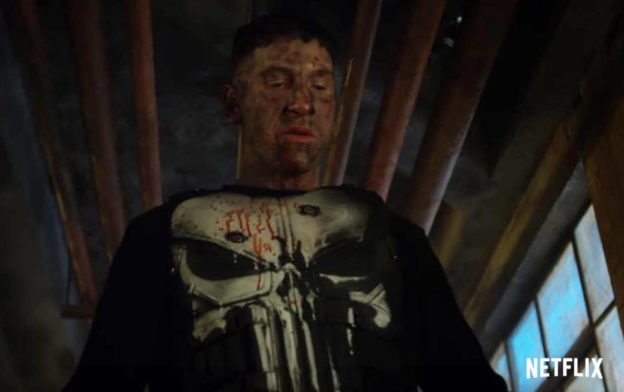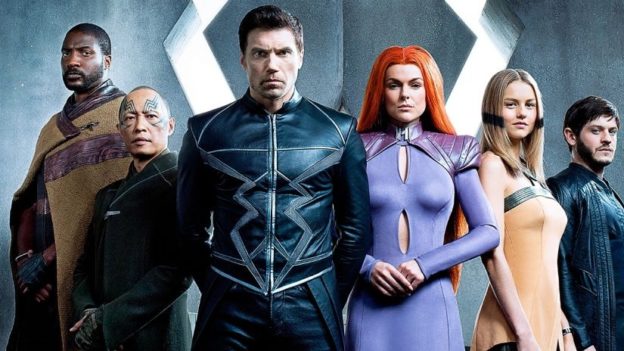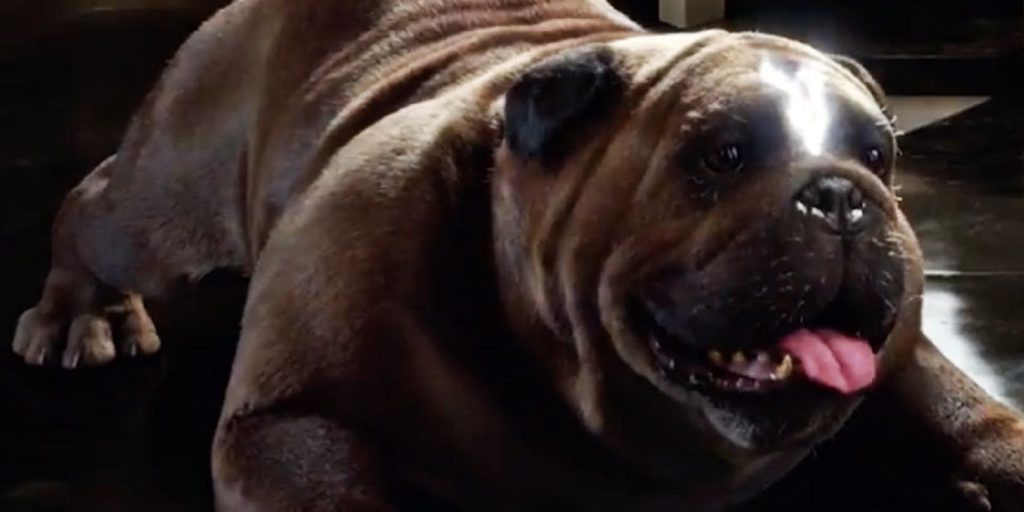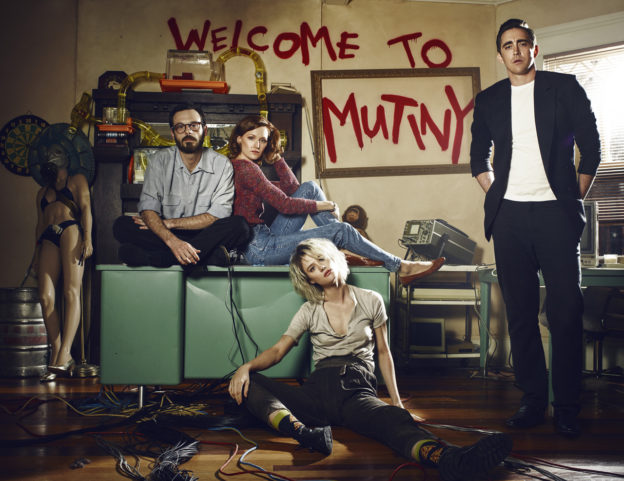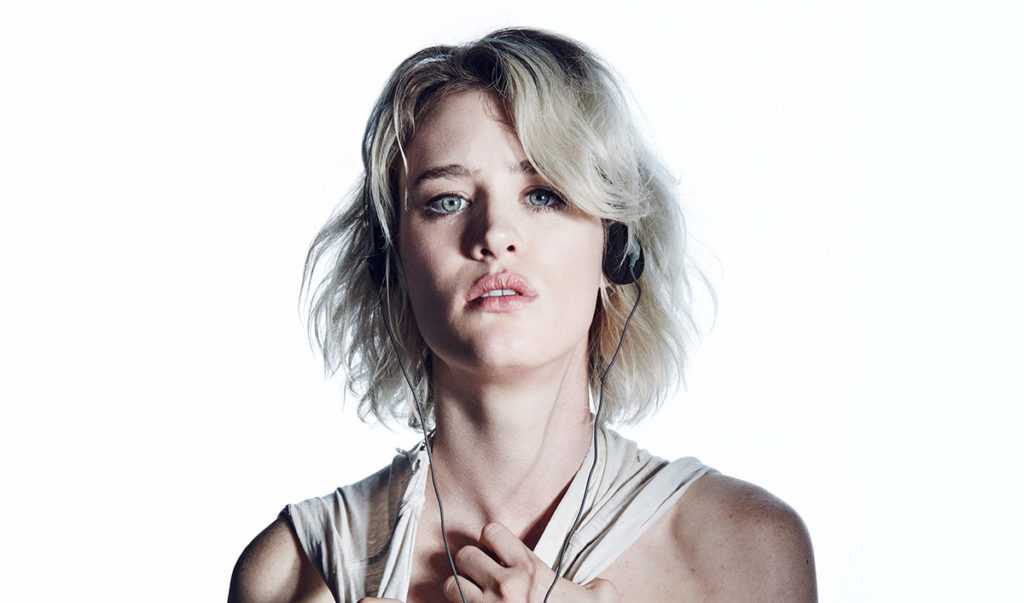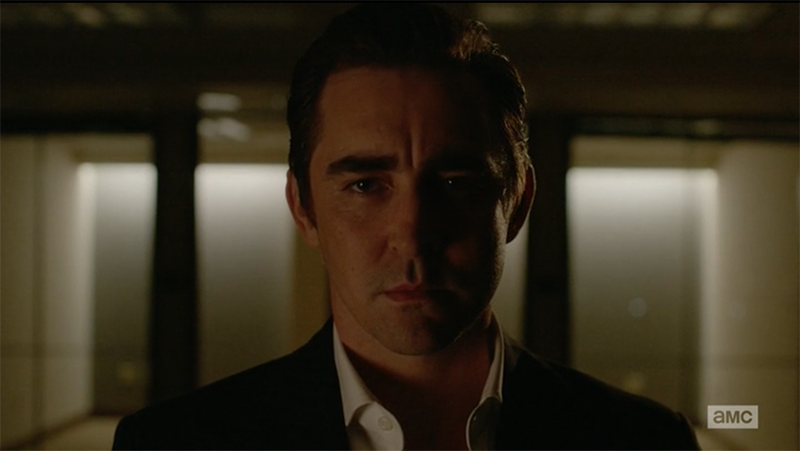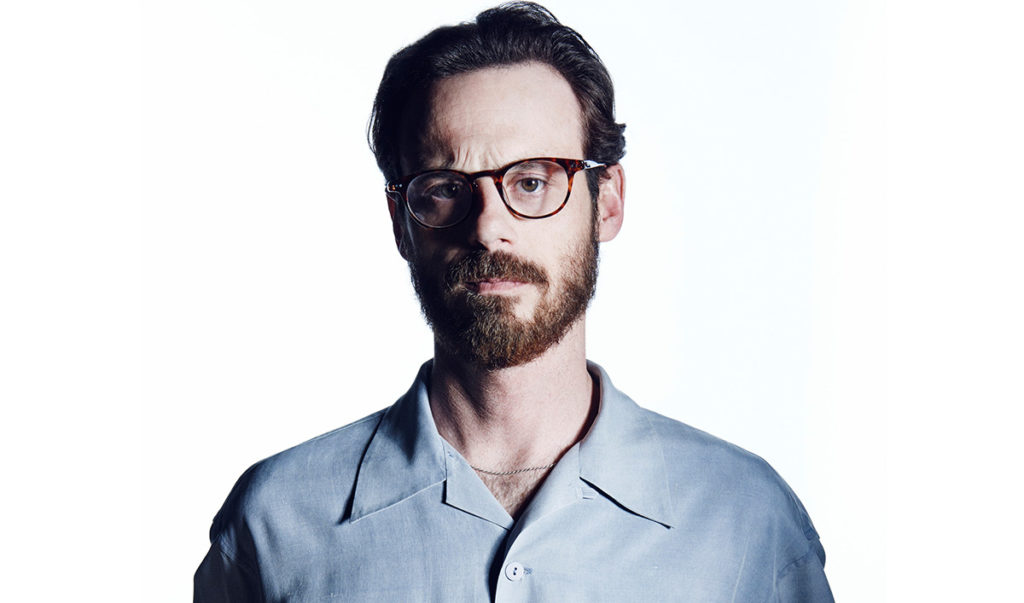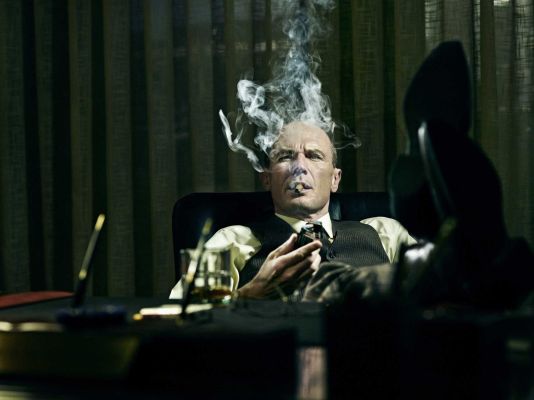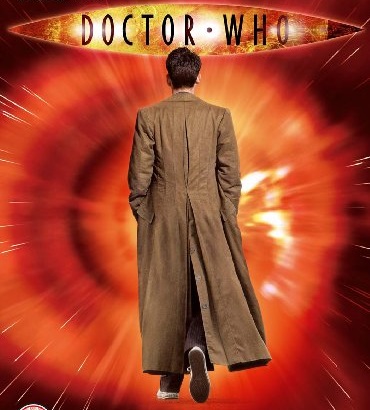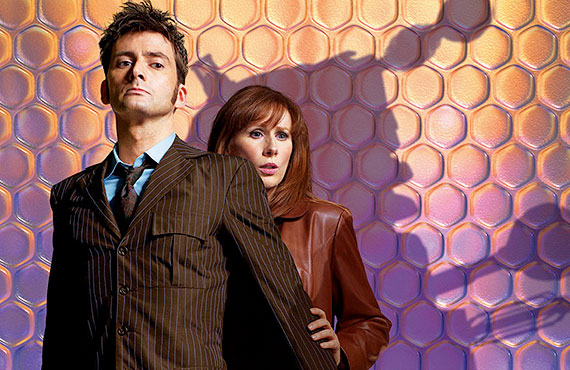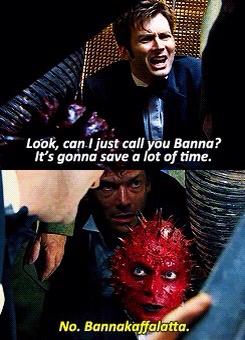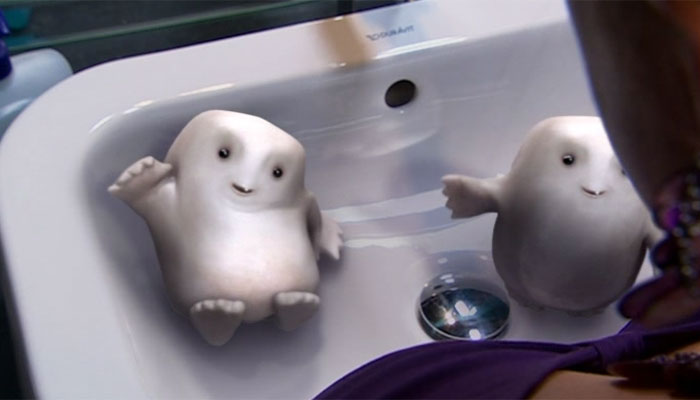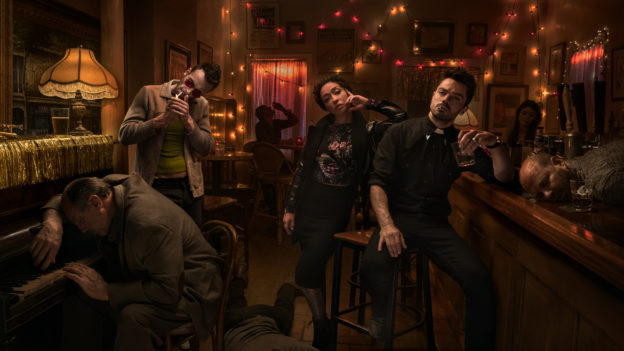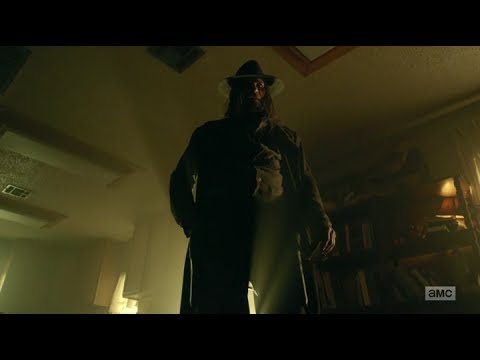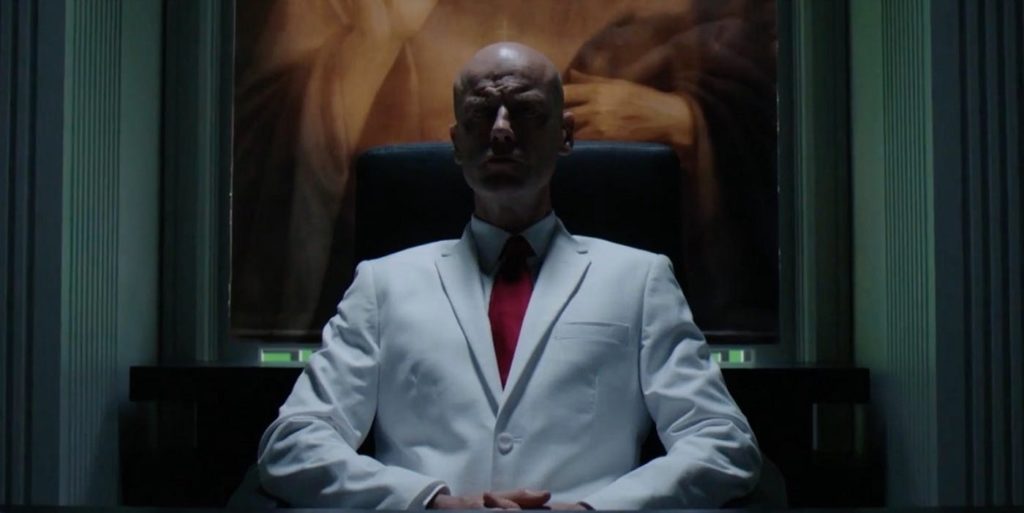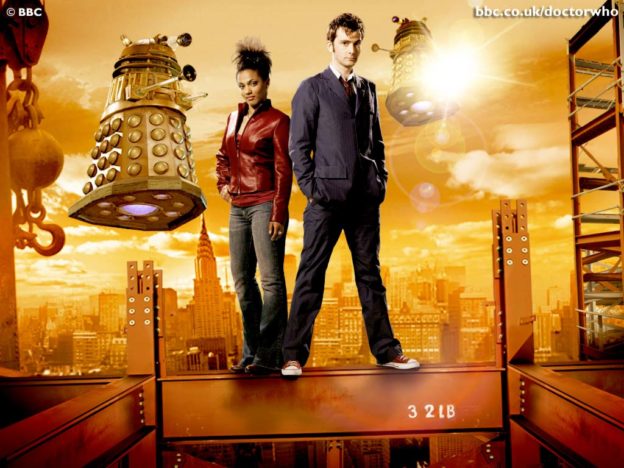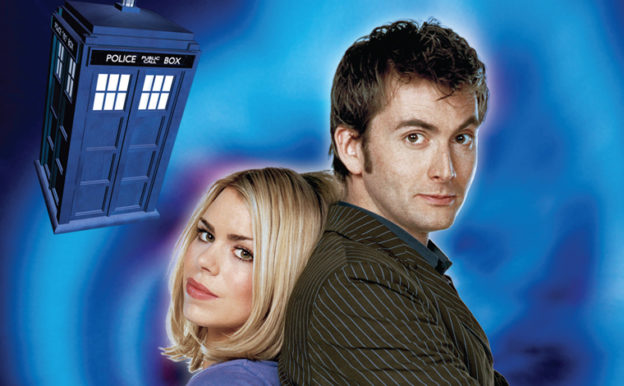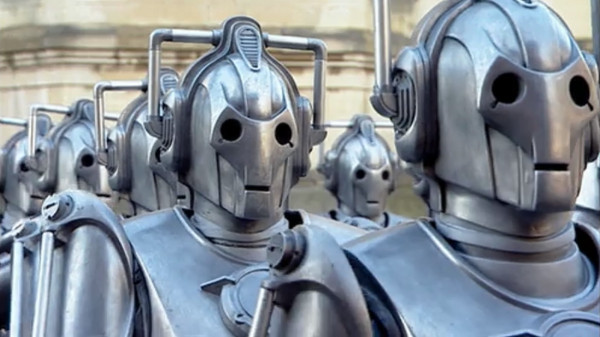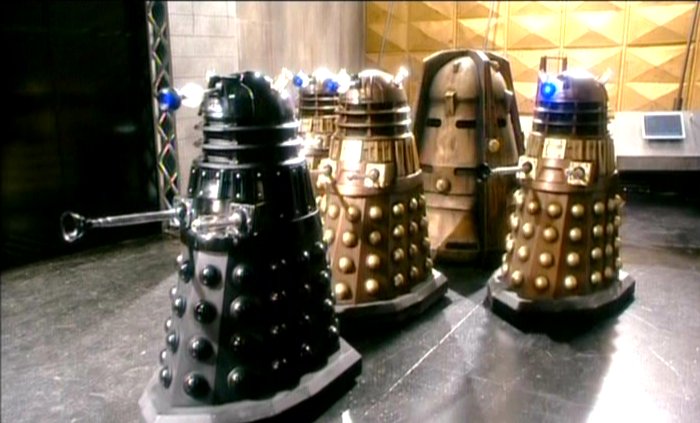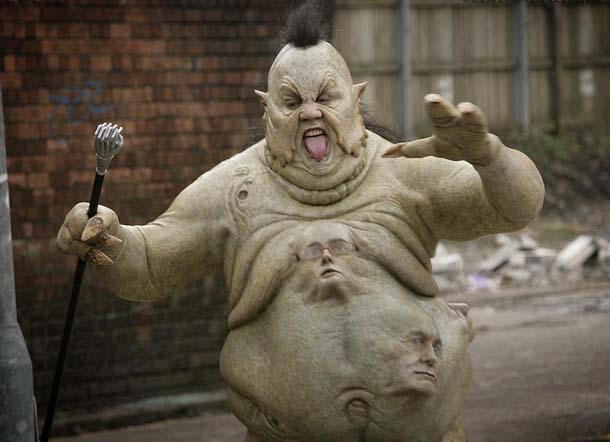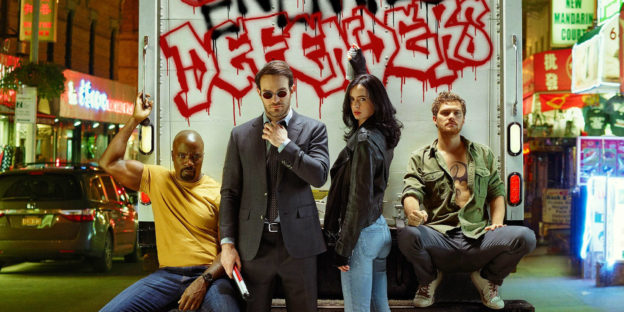Comic book TV is everywhere these days, and it’s happening all year. So I’ll hand out awards and rankings in June, but in the meantime, we’ll be reviewing shows one by one as they wrap up.
This installment: a breakout character from Daredevil gets his own solo series.
Short version: fun if you like violence, but Marvel Netflix, we need to talk about your pacing problems.
Premise
Frank Castle, as established in Daredevil’s second season, has been on a violent rampage of revenge ever since his wife and children were killed in a gang fight that was somehow orchestrated by rogue operatives of the US military to cover up something that happened in Afghanistan, and now that I write it out it sounds pretty convoluted… man Daredevil got scattered in its second season.
Anyway, given that when we last saw Frank he was learning that his former CO and his bosses were behind the assassination attempt via gang fight, naturally we join him having opted not to care about that and live in lonely, quiet seclusion… in the city where he was very publicly tried for mass murder a year or so ago. It’s hard to tell with Marvel Netflix, their timeline is fuzzy.
But Frank’s retirement doesn’t last long, as a former intelligence analyst turned outlaw hacker calling himself Micro tracks Frank down in an attempt to go after those guys we thought he was already going after.
Frank sets out to kill everyone responsible for his family’s deaths (for reals this time), but a Homeland agent named Dinah Madani is trying to get justice for one specific part of all that stuff Frank and his comrades-turned-nemeses did in Kandahar.
So the question looms: what will win, vengeance against the military/CIA conspirators, or justice? Or are they both basically the same? No. They aren’t. They try to be clear about that, but… we’re here for all the gun battles, but they don’t want to endorse vengeful murder-sprees, per se… awkward.
And for a change, I’m not going to complain about lack of connection to other Marvel properties. First off, the Punisher as a protagonist works better on his own rather than surrounded by other Marvel characters. Second, Marvel Netflix and the Marvel movies are not connected, they just aren’t, let’s all accept that. And third, it’s not even a problem that the only link to the other Netflix shows is a few appearances by Daredevil‘s Karen Page. Daredevil is out of play until his third season; The Punisher might be set in New York, but it never makes it to Harlem, so no Luke Cage; nobody has need or desire of a private detective, so no Jessica Jones; and unraveling the events of the series requires covert intelligence connections, forensic abilities, situational awareness, and the ability to recognize basic patterns, and that rules out Iron Fist.
Strengths
John Bernthal remains great in the title role, capturing Frank’s rage, grief, and even flashes of charm. Westworld’s Ben Barnes shines as Frank’s former combat buddy-turned-private military contractor Billy Russo. [spoiler title=’This right here is a spoiler, y’all.’ style=’default’ collapse_link=’true’]And when he inevitably turns out to be one of the bad guys, as we all must have known he was going to, he’s utterly believable as Frank’s equal in violence.[/spoiler]
Agent Madani follows in the footsteps of Marvel Netflix’s frequent attempts to pair a male hero with a strong, badass female co-lead. Actually not the men, ’cause Jessica Jones had Trish Walker. But this one might be one of their better attempts. She doesn’t need constant rescuing like Karen Page in Daredevil, doesn’t consistently fail at the one thing she’s supposed to be good at like Misty Knight in Luke Cage, and she isn’t savagely undermined by her writing like Elektra in Daredevil or Colleen Wing in Iron Fist, becoming subservient to the male hero’s arc at the cost of her own. She always has her own motives and agency.
Micro works, and is well acted.
And if you do enjoy bloody, violent revenge stories, they do not let you down on that front. Well, in episodes with action beats. Which I think is most of them?
Weaknesses
If the “Secret military wrongdoing in Afghanistan” plot doesn’t do it for you, or rooting for a guy whose go-to solution to problems is murder doesn’t appeal to you, well, there’s not much else to enjoy here.
Rawlins, the man behind Kandahar and architect of the Castle family’s deaths, is kind of just a blank slate of “corrupt, criminal, torture-happy would-be patriot.” He lacks depth, humanity, or redeeming qualities of any kind. But then Punisher villains can’t really be nuanced. A Daredevil villain can come down to philosophical differences driving different ideas of The Good; a Batman villain can be driven by sympathetically tragic events in their past, like Kite Man (hell yeah); an X-Men villain can be a good man thinking he’s protecting humanity (I’m referring mostly to Legion, not The Gifted, police dude from The Gifted is just an asshole); but when you exist to be someone for Frank Castle to murder for our entertainment, you kind of have to be unambiguously evil. Which… I mean, that’s fine, but at least try to be fun like Damien Darhk, or engaging like Kilgrave. Rawlins is just there and you want him not to be.
Madani’s partner, Sam Stein, is incapable of speaking without delivering ham-fisted exposition. Like, really ham-fisted. “Quite a story. Doesn’t bode well for me, your newly-assigned partner.” As natural-sounding expository dialogue goes, he’s somewhere between a Star Wars text crawl and Narrator Smurf.
Let’s talk about Lewis. In the first episode, Frank lurks around his old military pal Curtis’ support group for veterans. It’s the one scene in that episode where he acts like a human person with emotions. One of the veterans is a gun nut, liberal-hating, “keep America for white Christians” asshole, and his rantings catch the attention of a younger vet named Lewis, who mutters “sic semper tyranis.” A weirdly educated remark for someone who falls for ignorant hate speech so quickly.
Here come the spoilery bits.
If that had been the last we saw of Lewis until episode nine, that would have been fine. But no, we spend swaths of the first two thirds of the series watching Lewis have PTSD, decide that the only cure to his PTSD is to be back in combat, get rejected by Russo’s company Anvil because he’s very clearly too unstable for any sort of combat, and then slowly but surely turn to domestic terrorism, all so that he can distract Frank Castle from the main story for two episodes near the end of the season. Which, okay, while putting the plot on pause, allows for a couple of key character beats to happen (two in two episodes, that’s not a lot), but there must have been a more elegant way to do them.
And sure, yes, an examination of how life on the homefront is difficult for vets would be good, if not necessarily germane to classic Punisher stories, but surely the right approach would have been to show how not all vets turn into Castle-style murder machines, not to imply that PTSD turns vets into domestic terrorists because mental trauma renders them incapable of not fighting. Lewis had all the love and support you could ask for, and still went mad-bomber, and that does not feel super respectful to struggling veterans.
I get it, man, I get what you were trying to do. When the second-amendment, concealed-carry douchecanoes show up to point at Frank Castle and say “That’s my guy! A good guy with a gun! That’s what we’re saying!” the producers can point at Lewis and his “Jews control the internet” mentor and say “You idiots aren’t the Punisher, you’re these morons.” But if that’s what he’s for, you did not need to spend ten episodes failing to build Lewis up as a character just to make him a third-act bonus villain. If a third-act bonus villain is even needed, which brings us to…
The Ever-Present Pacing Problems, or “It’s called episodic narrative, look it up.” If you needed to pad out the first season with all of these dull, reductive Lewis scenes, maybe it’s time to rethink your episode counts. It’s happening more and more with Marvel Netflix, so it must be said… if you don’t have enough story for 13 episodes, you don’t need to make 13 episodes. And there’s more.
It takes three episodes for the Frank-vs-corrupt-CIA-guy arc to kick off. Three episodes waiting for the show to catch Frank back up to where he left off when Daredevil ended. Three episodes giving Punisher a second, worse origin. Guys, it’s time you gave up the whole “The reluctant hero must be gradually dragged back into action” routine. Only Daredevil has ever managed to hit the ground running. Even The Defenders took three episodes to get out of first gear, and it was only eight episodes long. Punisher could have been a tight ten, if they’d sped up the first act and restricted Lewis to that first scene and his bombing spree.
Being on Netflix means people can and often will binge-watch, but not always. Stop treating each Marvel Netflix show as one really long movie and learn how episodic narrative works.
High Point
It’s easy to spot off-episodes of the first season, but it’s a little harder to name standouts. There’s sort of a baseline level of decent quality that they sometimes fall short of, but never really break past. I guess… either episode three, “Kandahar,” in which we examine Frank and Micro’s pasts as they have the most awkward “getting to know you chat” possible, or “Virtue of the Vicious,” a Rashomon-style examination of the long-awaited end of Lewis’ arc.
Low Point
With two flow-breaking Lewis-centric episodes and an hour-long torture session to choose from, it should be hard, but… let’s talk about episode one, “3 AM.”
First off, Frank hunts down the last members of the gangs whose gunfight left his family dead, despite knowing that his ex-CO arranged all of that, so really he’s just hunting down pawns in his ex-bosses’ sick game. Having killed the final possibly unrelated peon, Frank takes the iconic skull costume it took him 12 episodes of Daredevil to get around to wearing and burns it. Then moves back to New York and, despite being a notorious criminal with a very distinctive face, takes a job with a construction crew, knocking down walls with a sledgehammer. Knocking down walls. On a construction crew. Don’t tell me they’re a demolition team, why would a demolition crew need a cement mixer.
Save for introducing Curtis and Lewis the Rat-Faced Time Waster, they spend the next forty-five minutes, forty-five goddamn minutes, with Frank’s asshole criminal co-workers verbally harassing and threatening him while he silently ignores them, hammering his walls and thinking about his dead family all day and all night. Finally, in the last five minutes, when the assholes try to kill the one co-worker who was nice to Frank after a botched robbery of a mobsters’ poker game, his former self is unleashed upon the assholes and the mobsters they robbed. Which would have been a great jumping off point for a classic Punisher vs mob story, but is instead when Micro spots Frank, after months of waiting for him to notice that intel he’d slipped Frank back in Daredevil. If it had been Frank vs. the mob, sure, maybe I could see him needing to be convinced to take up arms, since this Punisher didn’t fight mobsters, he only hunted people he blamed for his family’s death. And some ninjas. But this is just the same vengeance rampage.
The Punisher had an origin. We did not need to drag him back to square one just so he could be reluctantly pulled back into the same vengeance spree he was on when we last saw him. Stop with the reluctant heroes. Stop it.
It’s a weak opening, designed to fill in anyone who didn’t watch Daredevil, while annoying anyone who did watch Daredevil by taking a huge and unnecessary step backwards.
MVP
Gotta be John Bernthal. Like Daredevil season two, the show is at its best when he’s on screen. Unlike Daredevil, that’s most of the time.
Tips for Next Season
He’s run out of vengeance, so it’s clearly time for an Equalizer-style grudge match between the Punisher and the mob. That would be some classic Punisher storytelling, far more on-brand than taking on black ops groups. Maybe try something like that.
Also… The first episode ends with Micro spotting Frank through “gait recognition,” which, no, what is that… and then says “Welcome back, Frank.” Garth Ennis’ “Welcome Back, Frank” is a classic Punisher story filled with humour (often black), memorable villains, oddball supporting cast, and frequent, innovative action beats, like a shootout in a morgue or a chase scene through a zoo, forcing Frank to use zoo animals as weapons. It is everything you should have aspired to, and if you’re not going to manage it, then keep Welcome Back Frank’s name out of your mouth.
Overall Grade: B-
Coming soon to this feature: can I find a source for Runaways? Let’s find out.

